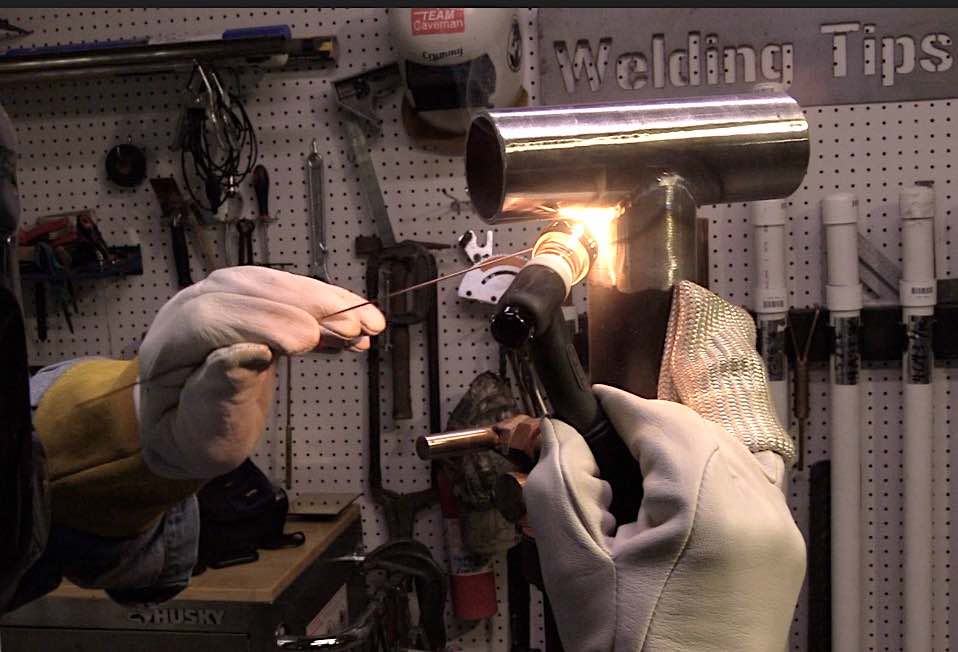So this time of year my garage in Ohio does not often see temperatures above freezing. This morning, I noticed that some of the spar rivets had some chipped primer around them. The 8 degree F temperature had apparently made it brittle enough to chip when I was driving the rivets. Made me wonder....what else should I avoid doing in the cold? Will the rivets themselves be more brittle since they were driven cold? Will gas welds made at 8 deg be a problem in service? I dont want to stop working, but please chime in and tell me what metalworking I should NOT do in these temps. Heating the garage is probably not an option. Thanks!
Announcement
Collapse
No announcement yet.
Cold weather building
Collapse
X
-
When I was researching welding so I could decide between gas and tig almost all of the references said not to weld below 40F for both types. Personally I've followed this guidance but my garage is easy to heat. Cooling rate is a major concern with welding 4130 and at those temps the cooling rate may very well be faster than desired.Scratch Built 4-place Bearhawk. Continental IO-360, 88" C203 McCauley prop.
- Likes 1
-
I am very,VERY concerned you welding in such cold temperatures. The chance of weld embrittlement is great when the weld cools too quickly. If I were to say I fabricated a part and right after welding I put it in a freezer set at 8F, all welding experts would say that I am crazy. A few sites:
I know they are TIG specific, but the principles are the same...cool the weld SLOWLY.
"The thing that makes chrome moly so brittle with heat is martensite. There are different phases and grain structures that steel passes through with heat and time, and what we want is austenite, but if the moly cools off too quickly, martensite is what you get, and when you see pictures of a 4130 weld breaking just outside the toe, it's for that reason."
FWIW, I keep my shop temperature usually 63-64F. When I was welding my fuselage I bumped the thermostat to 70F.
Comment
-
Thanks to all. Fortunately, the only welding I have done so far has been practice. But if someone told me I need to re-rivet the spars I might cry.
A while ago I bought PTI's epoxy primer...then discovered it recommends 75 deg temps to spray. That was the middle of last winter when the garage hardly got out of single digits. I will be buying polyfiber products in the future, as they work down to 35.
Comment
-
A decent wood stove can make winter working much more pleasant. Of course you have to be able to feed it, and some areas have regulations against them. I live in WI and can make the shop quite comfortable, even when it's miserable outside. I also find that a warm brain makes fewer mistakes than a cold brain
Comment
-
Before I could commit to buying my kit, I finished my unfinished garage with full insulation and sheetrock and installed a Hot Dawg natural gas heater. It's 68 degrees year-round in my shop. For a project that can span several years I think the shop prep is invaluable. Sorry, I know that's probably not the most helpful response.
For a project that can span several years I think the shop prep is invaluable. Sorry, I know that's probably not the most helpful response.
Comment
-
I totally agree with the "heat the garage" idea, but unfortunately my line of work doesnt allow me to be stationary. I have been working on this project since 2011 and have moved three times since then and may be moving again this summer. If there are good non-permanent and inexpensive heating options at reasonable prices I would be interested in trying them, but my garage is not well insulated.
Comment
-
Nich, I keep my shop @40 during the week and bump it up to 60-70 on the weekends when I am out there working. I will second what the others are saying about welding 4130 when it is much below 50 or so. Always observe the manufactures suggestion regarding temp during application or usage. As far as driving rivets in the cold, I have never had much luck. Usually the tails will crack on me while driving, occasionally the dome head will crack while being driven. MOST rivets drive easier the warmer it is out. I say most because there are some that are known as "ice box" rivets that you need to drive while they are frozen. If you are unable to heat the entire shop, you could pick up a toster oven from a second hand store or buy a new one and heat your rivets for a bit on the lowest setting. I went the first winter using a propane torpedo heater, it worked but propane got expensive and it stunk a bit. If you go that route get a carbon monoxide detector, it will build up quicker than you think. I asked my shop landlord if he could install a NG furnace in my shop before the next winter came around, works much better.Joe
Scratch-building 4-place #1231
Almost Wyoming region of Nebraska
Comment
-
A mobile shop could be kinda sweet if you are always moving around. A 20 to 25 x 8.5' enclosed trailer with furnace installed would work pretty good. Lots of snowmobilers in the mid-west so you might be able to find a used trailer all setup and ready.
Or go buy a used freestanding wood stove for cheap.Scratch Built 4-place Bearhawk. Continental IO-360, 88" C203 McCauley prop.
Comment




Comment